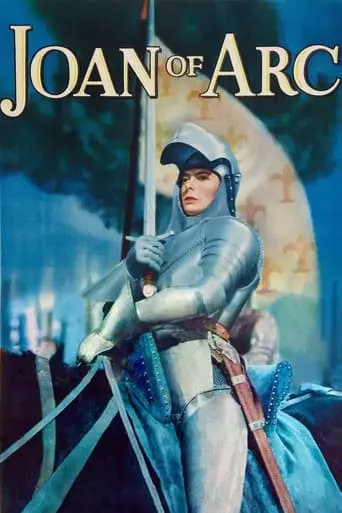In the 15th Century, France is a defeated and ruined nation after the One Hundred Years War against England. The fourteen-year-old farm girl Joan of Arc claims to hear voices from Heaven asking her to lead God’s Army against Orleans and crowning the weak Dauphin Charles VII as King of France. Joan gathers the people with her faith, forms an army, and conquers Orleans.
Joan of Arc (1948), directed by Victor Fleming and starring Ingrid Bergman in the titular role, is a historical drama that chronicles the life of the French heroine from her early visions to her martyrdom. The film begins with Joan, a young peasant girl in Domrémy, Lorraine, who experiences divine visions instructing her to lead France against the English invaders. Convinced of her divine mission, she seeks an audience with Charles VII, the Dauphin, and persuades him to allow her to command the French army. Under her leadership, the French forces achieve significant victories, notably lifting the siege of Orléans. However, her fortunes change when she is captured by the English, tried for heresy, and ultimately executed by burning at the stake.
The film is noted for its historical accuracy, with meticulous attention to medieval details, including the creation of Joan’s armor by the Metropolitan Museum of Art in New York City.
Ingrid Bergman’s portrayal of Joan is both powerful and nuanced, capturing the complexity of a young woman driven by faith and conviction. The narrative focuses on Joan’s unwavering belief in her divine mission and the political and religious forces that conspire against her. The film’s pacing and tone reflect the gravity of Joan’s journey, emphasizing themes of faith, sacrifice, and the struggle between personal conviction and societal opposition.
Main Themes in Joan of Arc
- Faith and Divine Calling: The film explores Joan’s profound faith and her unwavering belief that she is chosen by God to lead France. Her visions and sense of divine purpose drive her actions, highlighting the theme of spiritual conviction and its impact on individual destiny.
- Political and Religious Conflict: Joan of Arc delves into the complex interplay between politics and religion in medieval France. Joan’s rise challenges the established political order and the Church, leading to her trial and execution, which underscores the dangers of political manipulation and religious orthodoxy.
- Martyrdom and Sacrifice: The film portrays Joan’s willingness to sacrifice her life for her beliefs, embodying the theme of martyrdom. Her steadfastness in the face of persecution and her ultimate sacrifice serve as a testament to her unwavering commitment to her cause.
- Gender and Power: Joan’s ascent in a male-dominated society challenges contemporary gender norms. Her leadership and influence question traditional gender roles, highlighting themes of empowerment and the societal resistance to female authority.
Impact of Joan of Arc
Upon its release, Joan of Arc received critical acclaim for its historical accuracy, compelling performances, and production values. Ingrid Bergman’s portrayal of Joan earned her an Academy Award for Best Actress, solidifying her status as a leading actress of the era. The film’s dedication to historical detail, including the creation of authentic medieval armor, reflects a commitment to realism that was notable for its time.
However, some critics noted that the film’s pacing and tone might not appeal to all audiences, particularly those seeking a more dynamic narrative.
7 Reasons to Watch Joan of Arc
- Ingrid Bergman’s Powerful Performance: Bergman’s portrayal of Joan is both compelling and nuanced, capturing the complexity of a young woman driven by faith and conviction. Her performance brings depth to the character, making Joan’s journey both relatable and inspiring.
- Historical Accuracy: The film is noted for its meticulous attention to medieval details, including the creation of Joan’s armor by the Metropolitan Museum of Art in New York City. This dedication to authenticity enhances the viewing experience, providing a window into 15th-century France.
- Engaging Storytelling: The narrative effectively captures the essence of Joan’s life, focusing on her divine calling, military leadership, and ultimate sacrifice. The film’s pacing and tone reflect the gravity of Joan’s journey, emphasizing themes of faith, sacrifice, and the struggle between personal conviction and societal opposition.
- Cinematic Excellence: Directed by Victor Fleming, the film showcases high production values, including impressive set designs and cinematography that bring the historical period to life. The visual storytelling complements the narrative, immersing viewers in the medieval setting.
- Exploration of Universal Themes: Joan of Arc delves into themes of faith, political and religious conflict, martyrdom, and gender roles, offering a thought-provoking exploration of these enduring issues. The film prompts viewers to reflect on the nature of conviction and the societal forces that shape individual destinies.
- Cultural Significance: The film contributes to the rich tapestry of works depicting Joan of Arc, a figure who has inspired countless artistic and cultural expressions. Watching this film provides insight into the historical and cultural impact of Joan’s legacy.
- Educational Value: For those interested in history, particularly the Hundred Years’ War and the life of Joan of Arc, the film offers an engaging portrayal that can enhance understanding of this pivotal period in European history. The film’s dedication to historical detail provides a valuable resource for educational purposes.
How Will You Feel After Watching Joan of Arc?
After watching Joan of Arc, viewers are likely to experience a profound sense of admiration for Joan’s unwavering faith and courage. The film’s exploration of her trials and ultimate sacrifice may evoke feelings of empathy and reflection on themes of conviction, martyrdom, and the complexities of political and religious conflict. The portrayal of Joan’s strength and resilience in the face of adversity can inspire a deep respect for her enduring legacy. Overall, the film offers a poignant and thought-provoking experience that resonates with audiences long after the credits roll.

